Pooja Wanpal's Blog, page 2
March 17, 2014
Arbhaat Short Film Club : Last screening
The last session of Arbhaat Short Film Club was nothing short of memorable. As I prepared to leave the house, I began thinking of all the films I had seen, some that I had missed, and a few that I wish I had missed.
We are all familiar with death. For many years, I existed in a happy bubble where death only called upon others and loss was unknown. It was just a fact of life - something I knew I would have to deal with eventually, but sometime in the distant future. It all changed, as things inevitably do. Death was no longer impersonal, and it never receded into the background again.
If I could describe Rajesh S. Jala's documentary, 'Children of Pyre', in one world, it would be 'unsettling'. Many movies force us to face our own mortality - the good ones allow us to come to terms with it in one way or the other. 'Children of Pyre' tears down those blinkers by focusing on the life of seven children who work at the Manikarnika Ghat, in Varanasi.

Located on the banks of Ganges, Benares has always been a destination for the pious. And once we look past it's 'spirituality', it's other characteristics surface - filth, muck, tears, and a commercial view of all things religious. It is in this vein the film progresses - virtues of the holy city are not extolled, it's temples are not visited, it's sacred river does not qualify for a dip.
The documentary gives a new meaning to 'direct cinema', simply documenting the life and thoughts of seven odd boys who work as cremators. The film was shot over a period of 18 months, and consists primarily of conversation with the children, their unguarded, brutally honest responses to the questions asked by Jala, and their day to day life at the crematorium.
The film takes place on the crematorium, with the funeral pyres constantly burning in the background, but very little sorrow, that usually accompanies death is shown. There is a pragmatic relationship with Death, almost cynical, but truly, we all know - it's just business. There are a few scenes which take a toll - but they are simply the indicators of the magnitude of the harshness of the life of these children. How can we expect a child to burn the dead? To see the finality of death, something that surely chips away at innocence. Instead of going to school, these children work at the ghat. Their days are filled with a continuous blaze, the horrid heat of the pyres and the blazing sun, the nameless dread of the dead and the smoke that rises into the sky, taking their childhood along with it.
My heart just broke.
We are all familiar with death. For many years, I existed in a happy bubble where death only called upon others and loss was unknown. It was just a fact of life - something I knew I would have to deal with eventually, but sometime in the distant future. It all changed, as things inevitably do. Death was no longer impersonal, and it never receded into the background again.
If I could describe Rajesh S. Jala's documentary, 'Children of Pyre', in one world, it would be 'unsettling'. Many movies force us to face our own mortality - the good ones allow us to come to terms with it in one way or the other. 'Children of Pyre' tears down those blinkers by focusing on the life of seven children who work at the Manikarnika Ghat, in Varanasi.

Located on the banks of Ganges, Benares has always been a destination for the pious. And once we look past it's 'spirituality', it's other characteristics surface - filth, muck, tears, and a commercial view of all things religious. It is in this vein the film progresses - virtues of the holy city are not extolled, it's temples are not visited, it's sacred river does not qualify for a dip.
The documentary gives a new meaning to 'direct cinema', simply documenting the life and thoughts of seven odd boys who work as cremators. The film was shot over a period of 18 months, and consists primarily of conversation with the children, their unguarded, brutally honest responses to the questions asked by Jala, and their day to day life at the crematorium.
The film takes place on the crematorium, with the funeral pyres constantly burning in the background, but very little sorrow, that usually accompanies death is shown. There is a pragmatic relationship with Death, almost cynical, but truly, we all know - it's just business. There are a few scenes which take a toll - but they are simply the indicators of the magnitude of the harshness of the life of these children. How can we expect a child to burn the dead? To see the finality of death, something that surely chips away at innocence. Instead of going to school, these children work at the ghat. Their days are filled with a continuous blaze, the horrid heat of the pyres and the blazing sun, the nameless dread of the dead and the smoke that rises into the sky, taking their childhood along with it.
My heart just broke.
Published on March 17, 2014 21:58
February 7, 2014
Arbhaat short film club: 11th session
Having missed the last two sessions of Arbhaat, I was quite eager to head over to NFAI last Thursday. The theme was 'Sound and music'. I have begun to love the first Thursday of every month. It is a much welcome break from the monotony, and to some extent, decides what I will be immersed in the rest of the month. In almost every session I have been struck by some of the films that are screened - so poignant, so simple yet of such breathtaking complexity, films that tell the truth and the films that lie almost lovingly. I do not claim a deeper understanding of this visual medium - indeed, it is words that I string around myself - but over the past year, I have come to realize the advantages and shortcomings of both the media.
I cannot ever forget Telephone, a film by Shabnam Chopra, which had been screened at the 9th session. Based on a short story by Gabriel García Márquez, the film was a psychological thriller which held me spellbound and terrified me to my very core. When I read the original story, in Spanish with copious help from the dictionary, I found that I couldn't wipe the images from the film from my mind, and it was one of those rare instances when the movie was better than the story - perhaps because it was set in a familiar setting, and had been taken to a new level of horror that the story glossed on. But another short story from the same collection (Strange Pilgrims, original title: Doce cuentos peregrinos) 'Light is like water' (La luz es como el agua) took me over completely. I fell in love with Márquez, for his wonderful imagination, and his acceptance of the strange and the fatalistic, that is tinged by a cynicism that comes only from cultures with long memories.
Day Break Express
USA/1953/5:00
D. A. Pennebaker

An experimental film, Day Break express is a fast paced experience. It presents the New York city as seen through the windows of an elevated railway.
The Chorus
Iran/1982/17:00
Abbas Kiarostami
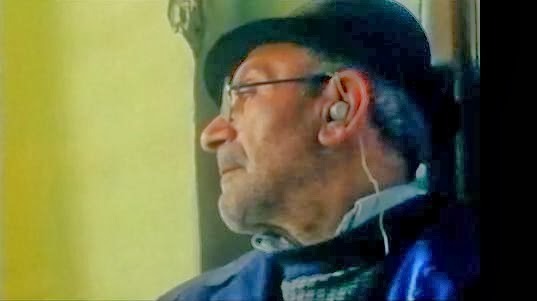
This film by the Iranian giant is a beautiful watch. An elderly man first roams around the city, wearing a hearing aid. Whenever the noise gets to him, he simply removes his hearing aid and is content in his muted world. When he returns home, he removes his hearing aid, and sits down to a light repast, eating and drinking contently. His granddaughters return from school and press the doorbell, but he is unable to hear them. A crowd slowly gathers under his window, rhythmically chanting, asking him to open the door.
I adored this film! It is in essence, so simple, so quaint and with it's theme of sound and noise, it is a beautiful, beautiful film.
Glass
Netherlands/1958
Bert Haanstra
Winner of the Academy Award for Documentary Short Subject, 1959
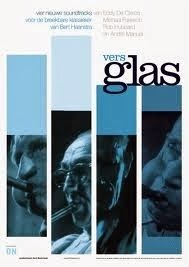
A documentary about the glass industry in Netherlands, this film tiptoes on the border of conventional. The sounds and images of the making of handmade glass is contrasted against those in an automated factory. The sounds provide a backdrop for the characters, as their actions are described and characterised by the sounds attributed to their characters.
Girni
India/2005/23:00
Umesh Vinayak Kulkarni
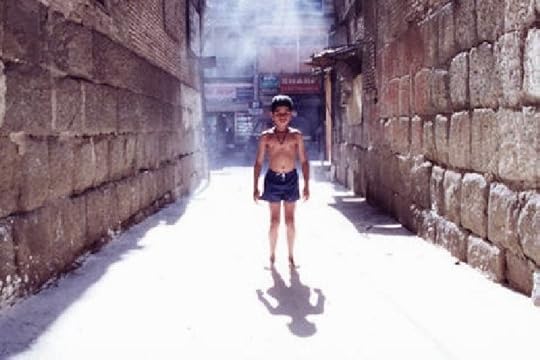
Umesh Kulkarni's films have long enchanted me. I had been desperate to watch this film for a long time, and I was ecstatic to discover it listed in this session. It lived up to all its hype and more - and it was everything I had dreamed of and more. Umesh Kulkarni's films contain a part of my heart - I find myself in his stills. I have often thought that his movies pick up on those common threads of life, that are yet so unique.
A family in dire financial strains turns to a grinding machine for salvation. The young boy, who had once been enchanted by the rhythmic whirring of the girni soon begins to detest it - the empty places in his mind reverberate with the machine's sound. A song of hope becomes the knell of depression. Everything in the house is covered with a thin layer of flour - dreams are strewn with the same white flour and try as he may, he cannot rid himself of it. His mother, meanwhile, struggles to make the ends meet. Her eyes, so plaintive in their silence are indicators of her helplessness. She can barely keep her head above the water - taking care of a child and an elderly, bedridden man while trying to search for a source of income. The movie ends on an emotional precipice, and as I looked into the fearful but defiant, scared but resolute eyes of that boy, my heart turned over, powerless and dismal.
I loved this film. I'll be watching it over and over, waiting for something to happen even though I know that I will end up looking into the eyes of that heart broken child, just before the credits roll down.
That Boy
India/2005/5:00
Q
A couple fights savagely in an apartments, as their son plays with his toys. Outside, the world it light up with firecrackers and lanterns. The harsh quarrel is in a sharp contrast with the joyousness of the festival. A stranger arrives at the door, an eerie smile on his face and a gun in in hand. I will not pretend to understand this film, but it has given me much food for thought.
The Bolero
USA/1973/26:00
46th Academy Award winner, Short Subject (Live action)
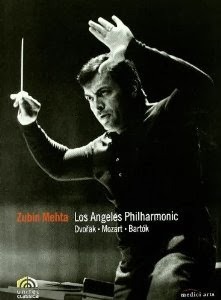
Zubin Mehta, the gifted conductor is the star of this film, but what stands out is the music - the sheer piece of brilliancy which is the true star in the film is evocative, startlingly mellifluous, and haunts you long after the last chord has dissolved.
As the Los Angeles Philharmonic gears itself to perform Ravel's 'Bolero', we see the chairs being assembled, the musicians talking about their career choice and the piece itself. Zubin Mehta, charming and suave talks about the 'Bolero'. The piece forms that last part of the film - heavenly music that reaches a cresendo, with Mehta in top form, conducting with a restless energy that is just as amazing to watch.
I cannot ever forget Telephone, a film by Shabnam Chopra, which had been screened at the 9th session. Based on a short story by Gabriel García Márquez, the film was a psychological thriller which held me spellbound and terrified me to my very core. When I read the original story, in Spanish with copious help from the dictionary, I found that I couldn't wipe the images from the film from my mind, and it was one of those rare instances when the movie was better than the story - perhaps because it was set in a familiar setting, and had been taken to a new level of horror that the story glossed on. But another short story from the same collection (Strange Pilgrims, original title: Doce cuentos peregrinos) 'Light is like water' (La luz es como el agua) took me over completely. I fell in love with Márquez, for his wonderful imagination, and his acceptance of the strange and the fatalistic, that is tinged by a cynicism that comes only from cultures with long memories.
Day Break Express
USA/1953/5:00
D. A. Pennebaker

An experimental film, Day Break express is a fast paced experience. It presents the New York city as seen through the windows of an elevated railway.
The Chorus
Iran/1982/17:00
Abbas Kiarostami

This film by the Iranian giant is a beautiful watch. An elderly man first roams around the city, wearing a hearing aid. Whenever the noise gets to him, he simply removes his hearing aid and is content in his muted world. When he returns home, he removes his hearing aid, and sits down to a light repast, eating and drinking contently. His granddaughters return from school and press the doorbell, but he is unable to hear them. A crowd slowly gathers under his window, rhythmically chanting, asking him to open the door.
I adored this film! It is in essence, so simple, so quaint and with it's theme of sound and noise, it is a beautiful, beautiful film.
Glass
Netherlands/1958
Bert Haanstra
Winner of the Academy Award for Documentary Short Subject, 1959

A documentary about the glass industry in Netherlands, this film tiptoes on the border of conventional. The sounds and images of the making of handmade glass is contrasted against those in an automated factory. The sounds provide a backdrop for the characters, as their actions are described and characterised by the sounds attributed to their characters.
Girni
India/2005/23:00
Umesh Vinayak Kulkarni

Umesh Kulkarni's films have long enchanted me. I had been desperate to watch this film for a long time, and I was ecstatic to discover it listed in this session. It lived up to all its hype and more - and it was everything I had dreamed of and more. Umesh Kulkarni's films contain a part of my heart - I find myself in his stills. I have often thought that his movies pick up on those common threads of life, that are yet so unique.
A family in dire financial strains turns to a grinding machine for salvation. The young boy, who had once been enchanted by the rhythmic whirring of the girni soon begins to detest it - the empty places in his mind reverberate with the machine's sound. A song of hope becomes the knell of depression. Everything in the house is covered with a thin layer of flour - dreams are strewn with the same white flour and try as he may, he cannot rid himself of it. His mother, meanwhile, struggles to make the ends meet. Her eyes, so plaintive in their silence are indicators of her helplessness. She can barely keep her head above the water - taking care of a child and an elderly, bedridden man while trying to search for a source of income. The movie ends on an emotional precipice, and as I looked into the fearful but defiant, scared but resolute eyes of that boy, my heart turned over, powerless and dismal.
I loved this film. I'll be watching it over and over, waiting for something to happen even though I know that I will end up looking into the eyes of that heart broken child, just before the credits roll down.
That Boy
India/2005/5:00
Q
A couple fights savagely in an apartments, as their son plays with his toys. Outside, the world it light up with firecrackers and lanterns. The harsh quarrel is in a sharp contrast with the joyousness of the festival. A stranger arrives at the door, an eerie smile on his face and a gun in in hand. I will not pretend to understand this film, but it has given me much food for thought.
The Bolero
USA/1973/26:00
46th Academy Award winner, Short Subject (Live action)

Zubin Mehta, the gifted conductor is the star of this film, but what stands out is the music - the sheer piece of brilliancy which is the true star in the film is evocative, startlingly mellifluous, and haunts you long after the last chord has dissolved.
As the Los Angeles Philharmonic gears itself to perform Ravel's 'Bolero', we see the chairs being assembled, the musicians talking about their career choice and the piece itself. Zubin Mehta, charming and suave talks about the 'Bolero'. The piece forms that last part of the film - heavenly music that reaches a cresendo, with Mehta in top form, conducting with a restless energy that is just as amazing to watch.
Published on February 07, 2014 11:20
November 10, 2013
Arbhaat short film club: 8th session
The 8th session of Arbhaat Short film club took place on the 7th. The theme was 'Gender'. Even though I had received the programme note beforehand, I had not had the time to go through it. So when I turned up at NFAI, I had my own preconceived notions about what type of films might be screened.
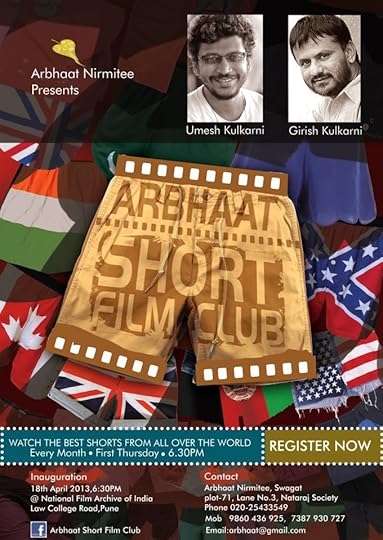
Gender - the very word evokes a dichotomy - male and female, man and woman. I was expecting something on these very lines - gender discrimination, female foeticide or violence on women, maybe. I had even wondered about the gender roles in India, juxtaposed against that in the rest of the world.
But the films were entirely different, and delightfully so. Instead of taking on these issues, which nonetheless important, the films touched a different range of issues altogether, which, though concerned intimately with the theme of gender, are hardly at the forefront of discussions on it.
But before, a short film on the life of Pandit Vishnu Digambar Paluskar was shown. It was a good short film, informative and interesting.
Undress me
Sweden, 2012, 15 minutes
Victor Lindgren

A man and a woman are talking in the club - obviously attracted to each other. She has pretty blonde hair, an oval face with strong cheekbones, and he has dark hair. He remarks time and again on her height, her deep voice as they leave the club to go to a burger joint.
She confesses that she is a transgender and had changed her sex three years ago.
This is the pivotal moment in the film. There is no drumroll, no emotional musical cresendo which highlights its importance. The film, the characters do not change.
You do. As soon as she said those words, I began looking for the man in her. It was wrong of me, I suppose, and the realisation was momentous - was I judging her? No, of course not.
But by looking for the man, I was questioning the women she was, I was questioning her identity.
I suppose this is what most transgender experience everyday - the discrimination, the stares, perhaps the sniggers. The film takes a look at one side of being a transgender - the emotional connect.
As Prof Nakhate later said, the gender divide is permeable. It is osmotic. It is neither rigid nor definite. We have defined it. We have separated people into groups and the pointed at those who do not conform to the norms laid down by us.
The film then proceeds to show the interaction between Mikaela, and the guy. Even though they are undressed, they just talk. At the end of the movie, the guy, who's about to leave tells her, "You seem like a nice girl." She nods and closes the door, and then looks straight into the camera. Her expression is indescribable. Though he says that she 'seems' like a nice girl, she has not been yet accepted as a 'girl'.
Sexy thing
Australia, 2006, 14 minutes
Denie Pentecost
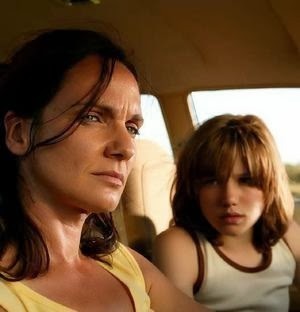
This film is a perfect example of how a story can be told with pictures alone. Apart from the opening lines, there is hardly any dialogue in the film.
Swimming in deliciously blue water, lying on hot tin roofs, a bedroom plastered with dreams of the sea. The longing for the sea, set against the dry, hot Australian echoes the same turmoil withing Georgie, a girl of about 12. She is assaulted by her own father, and the pain and rage is intersped with the escapist dreams of the sea. Her mother is driving, her brother is in the backseat-occasionally crying, but mostly asleep, and Georgie is in the passenger seat. The hot air is stifling, it blows in from the theatre screen straight into your mind, the flashes of the water become your salvation too.
It is the climax that is horrifying. While Georgie's reaction to the incident is apparent, we don't know what to make of the mother - she sobs, swears and rages by turn.
And then, when the car finally comes to a stop at Georgie's grandparents' house, her mother turns towards her and says, "We're here." The blue and red lights of the police car flash in the background and the police siren wails deafeningly.
Then we see the blood on her arms, and the wails of the father become clear.
A beautiful, amazing short film.
La Santa (The blessed)
Chile, 2012, 14 minutes
Mauricio López Fernández

A thirteen year old intersex girl, Maria is forced by her father to play the incarnation of Virgin Mary during the village festival, to 'fix' her. She is reluctant to get 'fixed', and believes that peeing while standing up not a bad idea at all. She snips away a portion of her hair every night - her own personal rebellion - but dresses up like a girl, except for her pair of boxers.
Moi Marjaani
India, 2012, 20 minutes
Anubhuti Kashyap

Mona, a single Punjabi mom runs a cyber cafe in Patiala. She often talks with Paresh ji, a man she has met online, who lives in Bombay. The film was was really very funny both subtly and overtly. It was a brief relief from the heavy movies that had been screened earlier, but was nevertheless charming in its own manner.
Call it slut
India, 2006, 14 minutes
Nishitha Jain
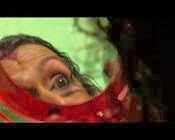
Laxmi Narayan Tripathi is no stranger to the public eye. In this film, which portrays her outrageous, truthful, and quite interesting views, she becomes more than a person and almost a phenomenon. I loved her views, she is honest and fearless.
But at the same time, I was also struck by her flamboyance. The contrast of Laxmi's flamboyance and Mikaela's understated appearance is interesting. Mikaela is trying to fit in, trying to be one of the crowds, and desperately wants to be accepted. On the other hand, I felt that Laxmi, quite used to the middle class morality and the hypocrisy that exists in our society, flaunts her persona even more, to show that she is unafraid. She knows she is going to be drawing eyes anyway, so why not do it with style?
I was quite delighted by this screening, and it gave much food for thought. One of the best sessions yet!

Gender - the very word evokes a dichotomy - male and female, man and woman. I was expecting something on these very lines - gender discrimination, female foeticide or violence on women, maybe. I had even wondered about the gender roles in India, juxtaposed against that in the rest of the world.
But the films were entirely different, and delightfully so. Instead of taking on these issues, which nonetheless important, the films touched a different range of issues altogether, which, though concerned intimately with the theme of gender, are hardly at the forefront of discussions on it.
But before, a short film on the life of Pandit Vishnu Digambar Paluskar was shown. It was a good short film, informative and interesting.
Undress me
Sweden, 2012, 15 minutes
Victor Lindgren

A man and a woman are talking in the club - obviously attracted to each other. She has pretty blonde hair, an oval face with strong cheekbones, and he has dark hair. He remarks time and again on her height, her deep voice as they leave the club to go to a burger joint.
She confesses that she is a transgender and had changed her sex three years ago.
This is the pivotal moment in the film. There is no drumroll, no emotional musical cresendo which highlights its importance. The film, the characters do not change.
You do. As soon as she said those words, I began looking for the man in her. It was wrong of me, I suppose, and the realisation was momentous - was I judging her? No, of course not.
But by looking for the man, I was questioning the women she was, I was questioning her identity.
I suppose this is what most transgender experience everyday - the discrimination, the stares, perhaps the sniggers. The film takes a look at one side of being a transgender - the emotional connect.
As Prof Nakhate later said, the gender divide is permeable. It is osmotic. It is neither rigid nor definite. We have defined it. We have separated people into groups and the pointed at those who do not conform to the norms laid down by us.
The film then proceeds to show the interaction between Mikaela, and the guy. Even though they are undressed, they just talk. At the end of the movie, the guy, who's about to leave tells her, "You seem like a nice girl." She nods and closes the door, and then looks straight into the camera. Her expression is indescribable. Though he says that she 'seems' like a nice girl, she has not been yet accepted as a 'girl'.
Sexy thing
Australia, 2006, 14 minutes
Denie Pentecost

This film is a perfect example of how a story can be told with pictures alone. Apart from the opening lines, there is hardly any dialogue in the film.
Swimming in deliciously blue water, lying on hot tin roofs, a bedroom plastered with dreams of the sea. The longing for the sea, set against the dry, hot Australian echoes the same turmoil withing Georgie, a girl of about 12. She is assaulted by her own father, and the pain and rage is intersped with the escapist dreams of the sea. Her mother is driving, her brother is in the backseat-occasionally crying, but mostly asleep, and Georgie is in the passenger seat. The hot air is stifling, it blows in from the theatre screen straight into your mind, the flashes of the water become your salvation too.
It is the climax that is horrifying. While Georgie's reaction to the incident is apparent, we don't know what to make of the mother - she sobs, swears and rages by turn.
And then, when the car finally comes to a stop at Georgie's grandparents' house, her mother turns towards her and says, "We're here." The blue and red lights of the police car flash in the background and the police siren wails deafeningly.
Then we see the blood on her arms, and the wails of the father become clear.
A beautiful, amazing short film.
La Santa (The blessed)
Chile, 2012, 14 minutes
Mauricio López Fernández

A thirteen year old intersex girl, Maria is forced by her father to play the incarnation of Virgin Mary during the village festival, to 'fix' her. She is reluctant to get 'fixed', and believes that peeing while standing up not a bad idea at all. She snips away a portion of her hair every night - her own personal rebellion - but dresses up like a girl, except for her pair of boxers.
Moi Marjaani
India, 2012, 20 minutes
Anubhuti Kashyap

Mona, a single Punjabi mom runs a cyber cafe in Patiala. She often talks with Paresh ji, a man she has met online, who lives in Bombay. The film was was really very funny both subtly and overtly. It was a brief relief from the heavy movies that had been screened earlier, but was nevertheless charming in its own manner.
Call it slut
India, 2006, 14 minutes
Nishitha Jain

Laxmi Narayan Tripathi is no stranger to the public eye. In this film, which portrays her outrageous, truthful, and quite interesting views, she becomes more than a person and almost a phenomenon. I loved her views, she is honest and fearless.
But at the same time, I was also struck by her flamboyance. The contrast of Laxmi's flamboyance and Mikaela's understated appearance is interesting. Mikaela is trying to fit in, trying to be one of the crowds, and desperately wants to be accepted. On the other hand, I felt that Laxmi, quite used to the middle class morality and the hypocrisy that exists in our society, flaunts her persona even more, to show that she is unafraid. She knows she is going to be drawing eyes anyway, so why not do it with style?
I was quite delighted by this screening, and it gave much food for thought. One of the best sessions yet!
Published on November 10, 2013 09:34
November 9, 2013
Bloglovin'
Published on November 09, 2013 22:16
October 19, 2013
Desi Pasta

My Doodle recipe is a part of Easy Doodle Recipe contest at BlogAdda.com in association with TastyKhana.com
Published on October 19, 2013 03:31
October 13, 2013
Cheese garlic bread
I had so much fun drawing the first doodle, that I finally succumbed to the urge and made this.

My Doodle recipe is a part of Easy Doodle Recipe contest at BlogAdda.com in association with TastyKhana.com

My Doodle recipe is a part of Easy Doodle Recipe contest at BlogAdda.com in association with TastyKhana.com
Published on October 13, 2013 04:39
October 12, 2013
cake in a cup
Aaditee taught me how to make cake in a cup. Here is the recipe:

My Doodle recipe is a part of Easy Doodle Recipe contest at BlogAdda.com in association with TastyKhana.com

My Doodle recipe is a part of Easy Doodle Recipe contest at BlogAdda.com in association with TastyKhana.com
Published on October 12, 2013 03:33
October 11, 2013
Arbhaat short film club: 7th session
After a lukewarm 6th screening, I was looking forward to the 6th screening, hoping that the theme would be more cohesive this time.
Though there was no single theme this time, the films themselves were quite good. Some of my favourites:
Beyond the window
Israel, 2011
Chen Shumowitz
One of my favourite films so far. Yoni and Shira, two young girls, are seen kissing through the window of the family home by Yoni's mother. She is quite upset, but her turmoil is nothing compared to Yoni and Shira's trepidation. Yoni is reluctant to go home, because she is sure that her mother is going to berate her, possibly beat her. Yoni is not sure of how her mother will react, but she is sure that her mother is going to be very angry. This drives a wedge of sort between the two girls. But when Yoni does go home, her mother does not refer to the incident at all. In a tenuous silence, she serves Yoni dinner, and the two women sit side by side, their brittle smiles identical, making an effort to understand each other.
Story of the desert
UK/Spain, 2002
Celia Galan Julve
A fictional account of Rosita Guzman, who broke out of prison in 1962 and disappeared in the Mexico desert. It is like a documentary, and is very entertaining.
This film was in Spanish and I was very, very happy to discover that I could follow most of it without even glancing at the subtitles!
Bon voyage
Switzerland, 2011
Fabio Friedlei
A story of immigrants. Though humorous, it has a dark undertone. Beautiful film!
Though there was no single theme this time, the films themselves were quite good. Some of my favourites:
Beyond the window
Israel, 2011
Chen Shumowitz
One of my favourite films so far. Yoni and Shira, two young girls, are seen kissing through the window of the family home by Yoni's mother. She is quite upset, but her turmoil is nothing compared to Yoni and Shira's trepidation. Yoni is reluctant to go home, because she is sure that her mother is going to berate her, possibly beat her. Yoni is not sure of how her mother will react, but she is sure that her mother is going to be very angry. This drives a wedge of sort between the two girls. But when Yoni does go home, her mother does not refer to the incident at all. In a tenuous silence, she serves Yoni dinner, and the two women sit side by side, their brittle smiles identical, making an effort to understand each other.
Story of the desert
UK/Spain, 2002
Celia Galan Julve
A fictional account of Rosita Guzman, who broke out of prison in 1962 and disappeared in the Mexico desert. It is like a documentary, and is very entertaining.
This film was in Spanish and I was very, very happy to discover that I could follow most of it without even glancing at the subtitles!
Bon voyage
Switzerland, 2011
Fabio Friedlei
A story of immigrants. Though humorous, it has a dark undertone. Beautiful film!
Published on October 11, 2013 22:31
Arbhaat short film club: 6th screening
After a lukewarm 5th screening, I was looking forward to the 6th screening, hoping that the theme would be more cohesive this time.
Though there was no single theme this time, the films themselves were quite good. Some of my favourites:
Beyond the window
Israel, 2011
Chen Shumowitz
One of my favourite films so far. Yoni and Shira, two young girls, are seen kissing through the window of the family home by Yoni's mother. She is quite upset, but her turmoil is nothing compared to Yoni and Shira's trepidation. Yoni is reluctant to go home, because she is sure that her mother is going to berate her, possibly beat her. Yoni is not sure of how her mother will react, but she is sure that her mother is going to be very angry. This drives a wedge of sort between the two girls. But when Yoni does go home, her mother does not refer to the incident at all. In a tenuous silence, she serves Yoni dinner, and the two women sit side by side, their brittle smiles identical, making an effort to understand each other.
Story of the desert
UK/Spain, 2002
Celia Galan Julve
A fictional account of Rosita Guzman, who broke out of prison in 1962 and disappeared in the Mexico desert. It is like a documentary, and is very entertaining.
This film was in Spanish and I was very, very happy to discover that I could follow most of it without even glancing at the subtitles!
Bon voyage
Switzerland, 2011
Fabio Friedlei
A story of immigrants. Though humorous, it has a dark undertone. Beautiful film!
Though there was no single theme this time, the films themselves were quite good. Some of my favourites:
Beyond the window
Israel, 2011
Chen Shumowitz
One of my favourite films so far. Yoni and Shira, two young girls, are seen kissing through the window of the family home by Yoni's mother. She is quite upset, but her turmoil is nothing compared to Yoni and Shira's trepidation. Yoni is reluctant to go home, because she is sure that her mother is going to berate her, possibly beat her. Yoni is not sure of how her mother will react, but she is sure that her mother is going to be very angry. This drives a wedge of sort between the two girls. But when Yoni does go home, her mother does not refer to the incident at all. In a tenuous silence, she serves Yoni dinner, and the two women sit side by side, their brittle smiles identical, making an effort to understand each other.
Story of the desert
UK/Spain, 2002
Celia Galan Julve
A fictional account of Rosita Guzman, who broke out of prison in 1962 and disappeared in the Mexico desert. It is like a documentary, and is very entertaining.
This film was in Spanish and I was very, very happy to discover that I could follow most of it without even glancing at the subtitles!
Bon voyage
Switzerland, 2011
Fabio Friedlei
A story of immigrants. Though humorous, it has a dark undertone. Beautiful film!
Published on October 11, 2013 22:31
August 21, 2013
Arbhaat short film club: 4th session
On the fourth screening of Arbhaat, the theme was Rebel. Instead of putting in the program as I usually do, I will stick to the films I loved the most.
Vitthal
India, 2009
Director: Vinoo Choliparambil
Length: 24 minutes
Vitthal is angry.
His grandfather has passed away, and being the eldest grandson, he has been forced to shave his head. His anger is the focal point of the film. The reactions, those of Vitthal and the rest of the characters, stem from this rage. A delightful film that will first leave you numb, then sympathetic, but angry. You want to admonish Vitthal for his thoughtlessness, but you know that he is suffering. You want to protect him from the world, but you know that it would be wrong. You want to wrap him up in cotton wool and expose him to harsh realities of the world. This conflict regarding the main character drives the movie effectively. We have been Vitthal - petulant, hurting, sad and lonely, even in the crowds.
Vitthal
India, 2009
Director: Vinoo Choliparambil
Length: 24 minutes
Vitthal is angry.
His grandfather has passed away, and being the eldest grandson, he has been forced to shave his head. His anger is the focal point of the film. The reactions, those of Vitthal and the rest of the characters, stem from this rage. A delightful film that will first leave you numb, then sympathetic, but angry. You want to admonish Vitthal for his thoughtlessness, but you know that he is suffering. You want to protect him from the world, but you know that it would be wrong. You want to wrap him up in cotton wool and expose him to harsh realities of the world. This conflict regarding the main character drives the movie effectively. We have been Vitthal - petulant, hurting, sad and lonely, even in the crowds.
Published on August 21, 2013 10:24



